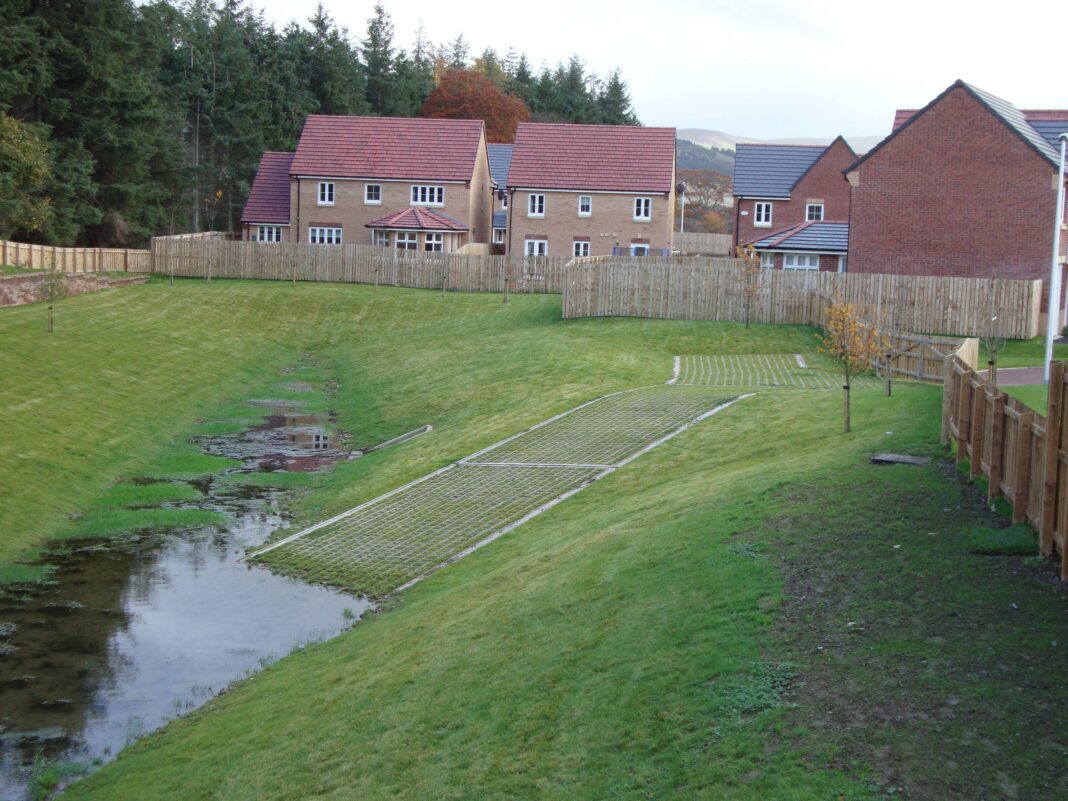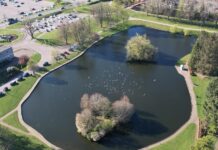
Gary Moug speaks to Grass Concrete MD Bob Howden OBE as the sustainable solutions company marks five decades of innovation
GRASS Concrete is celebrating 50 years in business this year. The company, which specialises in providing environmentally friendly building products, was founded in 1970 after architect Jack Blackburn invented a type of grass paving, known as Grasscrete.
Sustainability has always been at the heart of product development, meaning the firm has been ideally placed to prosper in the modern world, where green solutions are an integral part of most construction projects.
MD Bob Howden OBE recently told Project Scotland about the firm’s journey from a one-product offering to an internationally-renowned organisation with an extensive portfolio of solutions for a wide variety of projects.
Q) WHAT’S THE HISTORY OF THE BUSINESS?
A) The business was established in 1970 around the Grasscrete product, which was an invention by Huddersfield architect Jack Blackburn. In some ways it was very much the garden shed-type project. He perfected the design and then looked at the market to develop it. The business was set up using merchant bankers to provide the venture capital. Rodney Walker, who later became Sir Rodney Walker and chairman of UK Sport, was selected to run the business.
The early years were about developing awareness levels of the product. At that time, the only grass pavers available were derived from German pre-cast blocks. Jack really benchmarked those blocks, pretty much in the same way that car manufacturers will benchmark the competition and then look for something better in a new model. One of the shortcomings of the pre-cast block was that it was an individual block. If it didn’t have full grass cover, they would tend to settle underload – what we call elephant track. Jack combined the performance of reinforced concrete with the cellular structure of the grass paver. You’ve then got something you can drive lorries around on.
Rodney set about building the business. At the same time as he was looking to push the system forward in the UK, he also started the process of internationalising the business. We began establishing international licences and that currently stands at 30 around the world, trading into about 65 countries.
Our head office is in Wakefield, where we have nine staff. We have our own installation team as well.
In terms of other products, we began to expand in the mid-70s into other themed products. We have pre-cast Grassblock, we have a plastic system, a green roof system and we have a modular retaining wall system, which we have under licence from a company in France. Crucially, they all follow our environmental theme, which is very much the core of the business. We either look to improve the environment from the benefits of the product or alternatively, we’ll use recycled materials in production.
Q) GIVEN THE FOCUS ON ENVIRONMENTAL MATTERS NOWADAYS, DO YOU SEE YOURSELVES AS BEING AHEAD OF THE CURVE?
A) I’d probably say we’re on the curve at the moment. For the last 40 years or so, we’ve been very much ahead of the curve. We began life very much as a niche. Back in those days, people saw it more as a cosmetic factor than anything else, whereas now sustainability is very much at the heart of projects generally. It’s now seen as a mainstream mitigation product rather than something that people would say looks very nice but why would we specify it?
Q) HOW CHALLENGING IS IT TO INTRODUCE NEW PRODUCTS INTO THE MARKET?
A) It’s always been a challenge. I’ll give you an example from Hong Kong. When I started doing PowerPoint presentations to consulting engineers, you maybe had 20 engineers in the room and one token environmental engineer sat in the corner. It was almost a lip-service process.
But now when you do a PowerPoint presentation, the environment is very much at the head of the agenda. It’s part of a process worldwide where there is no longer the reluctance to embrace alternative, better, sustainable systems in construction. Back in the day we used to have clauses in some contracts which stated ‘You shall not use second-hand materials’ whereas now we get clauses encouraging people to use recycled materials. It’s a change in mindset.
Q) MOST MEMORABLE PROJECTS?
A) Staying on Hong Kong, the first storm channel lining that we did there. In the 80s, if you built a drainage channel in Hong Kong, it was like the scene in Grease where they’re racing cars down the concrete channel. That was really destroying the local wetland environment. Since we did the first Grasscrete there in 1986, the culture has changed to using environmental channels. The first one we did in Tai Po is now a country park. I go to Hong Kong two or three times a year and I always go and look at it because it’s like a touchstone for how things changed after that.
In the UK, we’ve done many large-scale, key projects like highway works as well as military works for the MoD, because its structure is ideal for things like RAF bases.
Q) HOW IMPORTANT HAS THE SCOTTISH MARKET BEEN?
A) The Scottish market has been key because I think it’s fair to say that Scotland led the way in terms of how you approach stormwater run-off from housing developments.
So many of the schemes involving things like flood storage areas were instigated based upon technology and experience of projects in Scotland. It’s always been a strong market for us.
In terms of the use of Grasscrete in housing projects, it’s probably the strongest area of the UK for us.
Q) WHAT IMPACT HAS THE COVID-19 SITUATION HAD ON THE BUSINESS?
A) In terms of throughput of products out the door, it’s impacted on that, but we have maintained activity during the pandemic. Grasscrete is massively used in flood defence so that has been seen as essential works. We’ve had NHS and military work ongoing.
Grasscrete is very much a specification product so there can be a fairly long gestation period between an engineer or architect initially discussing it with us and the project coming to fruition.
We have a backlog of projects where maybe the contractor has been in shutdown. We tend to view it as a hiccup that will catch up with itself rather than a loss of business. We’re fortunate in that respect, with it being a fairly specialist product, the business hasn’t gone away, it’s just been in some cases suspended for the moment.
Q) WHAT PLANS DO YOU HAVE FOR MARKING THE ANNIVERSARY?
A) We’ve launched a YouTube video which takes you through the 50 years. We want to big up the fact that we have been around for 50 years. We’re not jumping on the bandwagon of the environment. We wrote booklets about the benefits of permeable paving long before SuDS became the buzz expression.
Q) WHAT DOES THE FUTURE HOLD FOR THE COMPANY?
A) Another 50 years! More of the same. We’re always on the lookout for things we can add to the range. If you’re looking at the whole Grasscrete journey, we’re far from the end of the road. I’m negotiating new licences overseas, still networking with licensees, and having a 50-year celebration has been a big boost. It’s difficult at the moment because you can’t get on an aeroplane to see people.
In terms of where we go, governments have awakened to the need to safeguard the environment. There is more of a collective will to go there now. The future looks as bright as it has done at any stage over the last 50 years.








